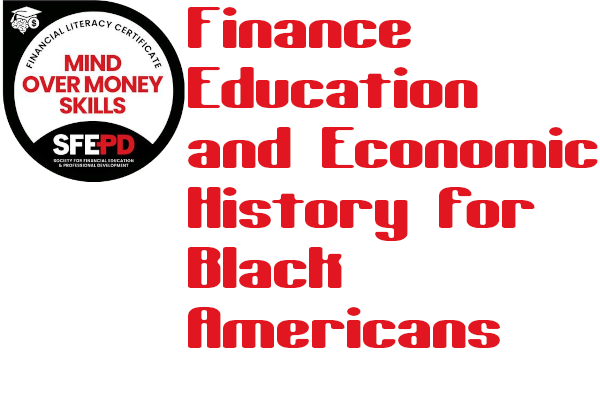HBCU Students Should Complete the SFEPD Mind Over Money Skills Financial Literacy Certification

The Society for Financial Education and Professional Development (SFEPD) is a nonprofit organization focused on financial literacy education. Their "four pillars" of focus: colleges, faith-based institutions, workplace financial wellness, and community workshops. In fall 2024, SFEPD created the Mind Over Money Skills Financial Literacy Certification course. This online course was created specifically for Black American students at Historically Black Colleges and Universities (HBCUs). Below is every reason most Black Americans should complete the Mind Over Money Skills Financial Literacy course.
Personal and Professional Finance Education for Black Americans
The Mind Over Money Skills certification includes 8 modules covering major finance industries including:
| Industry | Example(s) |
|---|---|
| Banking | Checking and savings accounts |
| Insurance | Auto, renter's, life |
| Investments | Individual Retirement Accounts (IRAs) |
| Mortgage Finance | Residential and commercial |
| Consumer Finance | Credit, personal loans |
With that said, the course instructors don't ramble impersonal tips about money management. They are and present themselves as Black men and women who are Black finance professionals. They don't reject their personal Black American experience. They use it to personalize their financial advice directly toward the Black American community and how we're impacted by systemic disenfranchisement. They don't shy away from notable examples of wealth destroyers that plague Black American families to this day:
- Gentrification and "white flight"
- Eminent domain and heir's property
- Most Black Americans don't have a will
- Blacks being less likely to own homes, businesses, retirement savings, investments, etc.
One example I greatly appreciated was about redlining. The Federal Housing Administration (FHA) refused to insure mortgage loans in Black communities for decades. The Fair Housing Act of 1968 was supposed to fix this. It didn't. I appreciate them mentioning this because it explains part of the history, the why, behind how we - Black American Descendants of Slavery (ADOS) - got here as a people in 2025.
Such nuggets arm us against whitewashed history gaslighting Blacks as if systemic racism doesn't still impact us today. Untold Black history like this justifies the argument for reparations. There's so much of that history, and it takes a collective effort to undo our false history. That is why I wrote a post dispelling the myth that Blacks commit over 50% of violent crimes. If you're interested in learning more bout Black economic history, I recommend reading The Color of Law.
Goal-Driven Decision Making
The title "Mind Over Money" is fitting because the course stresses how to implement the information. Each section closes with calls to action (CTAs), clear steps to apply what you learned. Its effective course design and aligns with the "behavioral finance" concept. Behavioral financial advice involves taking into account emotional and behavioral factors to encourage better decisions. The course stresses how spending habits should be directly related to long-term goals. Put another way, much of what you buy should be to invest in yourself - your health, career or entrepreneurial goals, retirement funds, family.
This course isn't just about helping HBCU students make more money. Its about strategies for budgeting, smart investments, generational wealth, and well-thought out financial habits. There's cost of living and cost of lifestyle. All these tools help you reap the benefits of financial literacy.
Why is financial literacy important for Black Americans, especially younger HBCU students?
- The fight for reparations is far from over. You can't walk around like you'll receive thousands of dollars "soon enough."
- The lie that is Diversity, Equity, and Inclusion (DEI) will not repair generations of systemic anti-Black racism.
- Black Americans collectively control 1% of the country's wealth. That won't improve without concentrated effort to improve finance skills.
- Times are getting harder. Harder economic times will impact student loan payments.
- Savings and investments compound over years.
"Cash rules everything around me." - Wu-Tang Clan
The Mind Over Money Skills course isn't a preachy "pro-Black," anti-white, or African diaspora course. They don't use such language or harp on Black nationalism. They educate Black Americans on financial competence supported by facts and history.
Free, Short, and Self-Paced
The Mind Over Money Skills course is free and self-paced. HBCU students gain immediate access when they sign up with their HBCU email address.
HBCU alumni can email SFEPD requesting access with their justification. I was approved within days. The course took me approximately 5 hours to complete.
Earn a Credly Digital Badge
Mind Over Money Skills is SFEPD's only course, and it rewards a Credly digital badge. There are a few advantages to digital badges.
- Digital badges are transparent. With one click employers can verify a credential's earning criteria, issuing organization, and issue date.
- Digital badges are accessible to whomever you choose - everyone, those with a direct link, or nobody. Sometimes its best to move in silence.
- A 2016 Wonderlic survey reported that 83% of employers preferred a digital badge over a transcript when verifying students' skills. It also stated that 86.6% of employers want local educators to provide job-specific badges for skill verification.
A decade later, many industries and employers have yet to embrace digital badges.
Great Primer for Black Finance Students
Current HBCU students should complete the course, then apply for the SFEPD Student Ambassador Program. You'll stand out as a leader among the HBCU community and your peers. Potential employers, mentors, and collaborators respect that. It could provide amazing opportunities to network. "Your network is your net worth," said someone somewhere.
High schoolers curious about HBCU finance programs should see this as a good primer for different aspects of the industry. Here's my recommendation:
- Earn the Mind Over Money Skills Credly badge.
- Add the badge to your resume and LinkedIn profile if its short.
- Research the best HBCU for finance education and your career goals.
- Contact multiple HBCU finance colleges for info on concentrations, career support, accreditation, culture, scholarships, affiliations, etc.
- Apply to multiple HBCUs. This increases your chances of being accepted in one. It also gives you leverage to choose which HBCU to attend.
- Choose an HBCU.
Non-students wanting to improve their money management skills should still get a spark from the content.
Lastly, a short list of resources for various learning styles:
- Books The Color of Law and PowerNomics
- YouTube channel Pocket Watching with JT (not me)
- The Momentum Advisors podcast
- Association of African-American Financial Advisors (AAAFA) for advice, mentorship, scholarships, and other resources from Black financial advisors
"Knowledge is [potential] power." - Marcus Creighton
Tags: hbcus, college, black-community, black-owned-businesses




